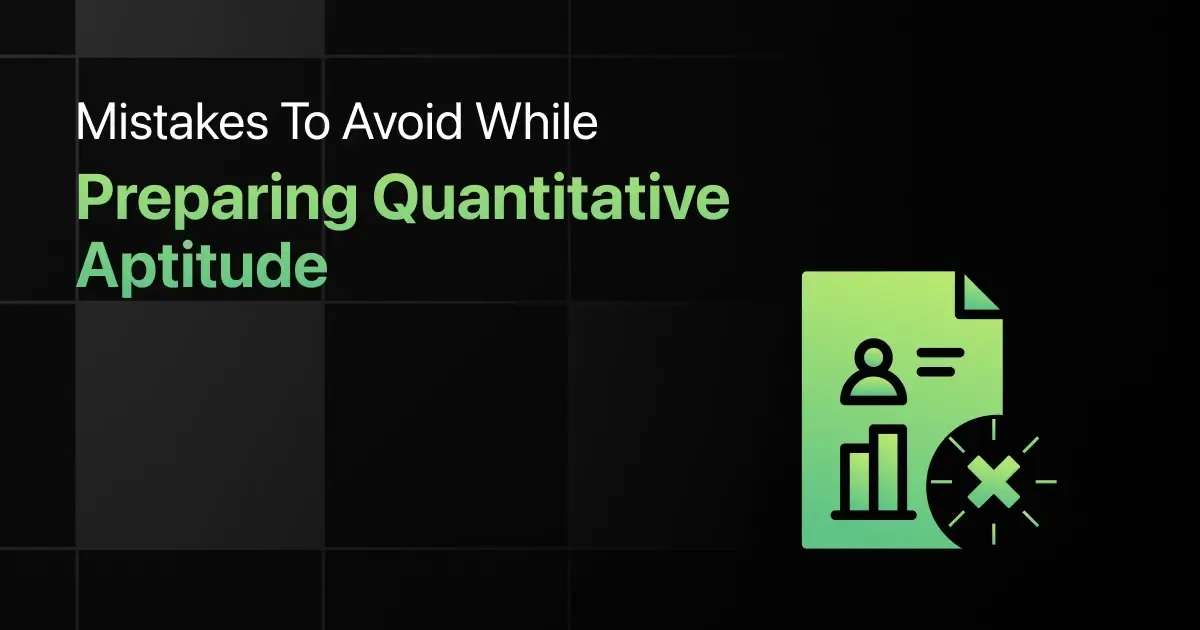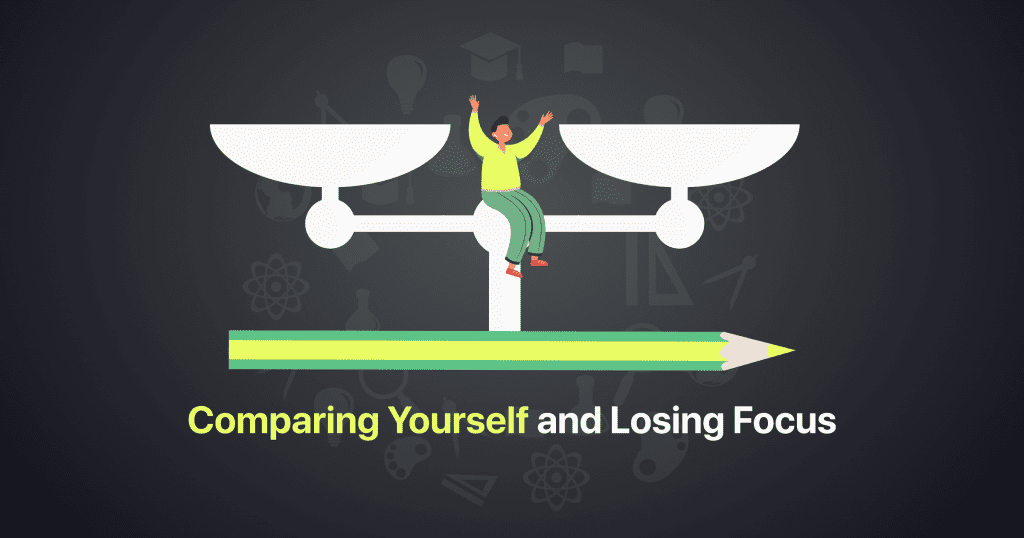Mistakes to Avoid While Preparing Quantitative Aptitude

Quantitative Aptitude is a section that even toppers do not take lightly, as it is one of the major challenges for clearing the placement examinations. Students also prepare their hardest because of the weightage it carries in the examinations.
However, with high weightage comes extremely unwise mistakes in preparation. Most students have a solid understanding of the principles but lose touch by not polishing them enough during preparations. Many students also struggle with self-discipline and tend to pay for it.
So, to ease this challenge and level the playing field, we are discussing mistakes to avoid while preparing Quantitative Aptitude.
Mistakes to Avoid While Preparing Quantitative Aptitude For Placements
Following are the mistakes to avoid while preparing Quantitative Aptitude:
1. Not Having a Smart Study Plan



Many students make a study plan that involves very heavy lifting and a lot of unnecessary mental efforts. Students should understand that there are two ways of learning things, the first is the ‘hard’ way, and the second is the ‘Smart’ way.
Merely reading and repeating texts or notes does not represent active participation in the material. It is basically a review of your notes. Reading texts from books and notes is not the same as studying, and these things constitute the ‘hard’ way.
How to Avoid this Mistake?
The ‘Smart’ way is the way that enables you to understand a topic better rather than mugging it up with no clear objectives. It includes techniques such as making a topic-by-topic study guide and saying the facts out loud in your own words as if you were a teacher presenting the topics to a class.
Develop quizzes on the subjects you read about during the day to help you revise them in a creative manner. To grasp a subject, you can generate examples from your encounters and create icons or symbols that reflect formulae and equations. To better comprehend the topic, students should solve the problems and describe the methods and why they function.
2. Referring Multiple Resources at Once



Many students make the mistake of allowing themselves to fall into the trap of ‘impulse advertising’, which promises quick fixes to your problems and guaranteed results. In the end, students purchase these unnecessary resources and end up getting confused by referring to multiple resources at once.
How to Avoid this Mistake?
Students should refer to authentic resources only, and they should go through them one at a time to avoid confusion. Students can also take the help of prominent websites and YouTube channels that industry experts and professionals manage to avoid any confusion in their Quantitative Aptitude preparations.
3. Playing For Speed Straightaway



Many students choose to solve questions as fast as possible to finish the question paper well before the time to save time for revisions. But this method tends to go wrong as students make many careless mistakes like subtracting the wrong number, mistakes that could have been avoided with a little bit of attention.
How to Avoid this Mistake?
Students should understand that the time limit is not just for revisions but for solving problems too. And they should not hesitate to take ample time to solve the problems in a proper way. You can practice on mock tests to manage your time management skills. You can also learn techniques to boost your calculation speed.
Further Reading: How To Increase Solving Speed In Quantitative Aptitude
4. Not Taking Enough Mock Tests



Many students make the mistake of not taking enough mock examinations, making rash judgments on the actual exams that could have been avoided.
Mock tests prepare students for actual test conditions by making them answer questions in a time-constrained environment, testing their abilities to manage pressure. It also helps students to deal with the nature and structure of questions and makes them ready to deal with any alterations in the future.
How to Avoid this Mistake?
A daily mock test is necessary to prepare for the Quantitative Aptitude examination. Take a practice test on a daily basis to assess your strengths and weaknesses. When you finish the course, the very first thing you need to do is take as many mock tests as practicable.
5. Skipping Analysis of Mocks



Many students make the mistake of skipping the analysis of mocks after taking them. This habit can be disastrous as the students never get to know where they are making mistakes and what is their accuracy rate?
How to Avoid this Mistake?
Students should understand that it’s not necessary to attempt every question in the exam. As long as they are attempting a majority ranging from 90-95% of questions, they can still score high marks.
Students must thoroughly analyse their mocks and draw an accuracy percentage from them (the number of correct answers).
If the percentage is more than 70-80% at any given time, you are going in the right direction. If the percentage falls below that number, you need to practice more.
6. Not Doing Revisions



Several students make mistakes by doing revisions of the topic learned during the day. It can lead to serious problems like forgetting formulas and equations and not understanding the concept itself. Lack of practice or revision can make students anxious in the examinations when they encounter a problem they thought they knew but couldn’t remember now.
How to Avoid this Mistake?
For generations, repetition has been utilised as a memorisation technique. The right kind of repetition could assist your memory significantly. If knowledge is repeated or revisited on a frequent basis but at gradually increasing intervals, it gets transferred to another brain region to be retained in long-term memory. To study for Quantitative Aptitude placement exams, you must practise all you have learnt.
7. Comparing Yourself and Losing Focus



Many students make mistakes of comparing themselves to others, leading to decreased morale. Low confidence can lead to making other mistakes like calculations and not having the willingness to study.
Students compare themselves with other students in terms of study hours, proficiency in topics, mock test marks and even calculation speed.
How to Avoid this Mistake?
Students must understand that every individual is born and brought up in a different set of circumstances, and that plays a significant role in their understanding. These sets of circumstances also play a massive role in shaping their strengths and weaknesses.
So maybe the student who is good at the concept of trigonometry is not good at the concept of simplification or the student, making you realise that every person has their weakness and strengths and everybody is trying to improve upon them.
So try to analyse the good habits of different students and try to adopt them as your own, which will boost your confidence and morale once successfully done.
Final Words
We hope this article helps you to identify and understand the mistakes to avoid while preparing Quantitative Aptitude. Quantitative Aptitude is a challenging section to master, but students should understand that with proper preparation and smart guidance, it can be a piece of cake. If you have queries and suggestions, feel free to drop a comment in the comments section below.
Explore Quantitative Aptitude Guides
- Quantitative Aptitude Accuracy Guide
- Quantitative Aptitude Easiest Topics
- Quantitative Aptitude Learning Order
- Quantitative Aptitude Scoring Guide
- Quantitative Aptitude Solving Guide
- Quantitative Aptitude Topics for IT Companies
- Quantitative Aptitude Topics for Placement Exams
Explore More Quantitative Aptitude Resources
Related Posts


Quantitative Aptitude Cheat Sheet
Quantitative Aptitude is a crucial aspect of many exams, interviews, and job placements. It requires the ability to perform mathematical …
Warning: Undefined variable $post_id in /var/www/wordpress/wp-content/themes/placementpreparation/template-parts/popup-zenlite.php on line 1050








